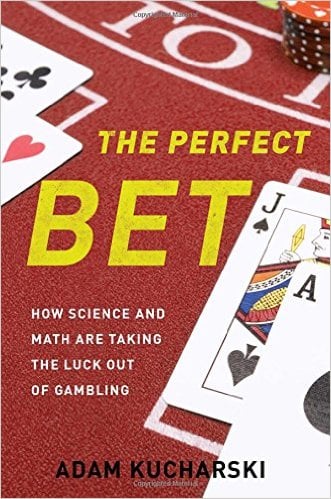“The Perfect Bet” Shows Link Between Science and Gambling, According to Mathematician Adam Kucharski
Posted on: May 8, 2016, 10:00h.
Last updated on: May 6, 2016, 04:59h.

British mathematician Adam Kucharski says in his debut book “The Perfect Bet: How Science and Math Are Taking the Luck Out of Gambling” that scientific pursuits and the development of the modern world have benefited greatly from gambling.
Now, you might not think this particular topic would be the bailiwick of a lecturer in Infectious Diseases at the London School of Hygiene & Tropical Medicine. But there you go.
Kucharski, who holds a degree in mathematics from the University of Warwick and a Ph.D in applied mathematics from the University of Cambridge, says card games and other casino formats have been used by scientists and mathematicians in developing theories that have had a great deal of impact on our everyday life.
Spanning mathematics, psychology, economics, and physics, Kucharski says his book “explains why gambling continues to generate insights into luck and decision-making today.”
“From Galileo to Alan Turing, betting has been scientists’ playground for ideas: dice games in sixteenth-century bars gave birth to the theory of probability, and poker to game theory,” his book cover reads.
“The line between luck and skill, and between gambling and investing, is rarely as clear as we think,” Kucharski recently stated.
Risky Business
Gambling is defined as “the activity or practice of playing at a game of chance for money.” Of course, seasoned players and especially pros believe there’s a fundamental element of skill involved with many table games, such as poker and blackjack. Or even baccarat, if you’re Phil Ivey.
Kucharski says the same skillset professional gamblers utilize in their decision-making process has been employed by many of mankind’s most distinguished philosophers and theorists.
In an interview this week with Britain’s The Guardian newspaper, Kucharski says gambling and the games it spawned played a role in the development of probability theory, expected value concepts, random events and luck, the concept of utility, chaos theory, the Monte Carlo method, and game theory.
Though Kucharski argues in his book about the role gambling and outcomes play in applied sciences, unfortunately for gamblers, there remains no “perfect bet” at a casino.
“In sport, as in betting, the best teams don’t get it right every time. But they know how to win more often than their opponents,” Kucharski wrote in UK magazine the New Statesman, which focuses on politics and the modern zeitgeist.
Gambling Theory Has Long History
Kucharski’s book is garnering much press, especially in his native country, but research into the correlation between science and gambling is nothing new.
The earliest forms of recorded gambling date back some 5,000 years to the ancient Egyptians, who spun a small bone on a board divided into four sections with wagers on where the marker would land. We’re guessing it goes back much further than that, though. Prehistoric man most likely did Rock, Paper, Scissors, but without the scissors. Or the paper.
Roman Emperor Claudius was an obsessive gambler who even authored a piece titled “How to Win at Dice.” That’s the equivalent of penning a book today about how to win at slots (spoiler alert: it’s unlikely in the long run).
Countless books have been written on how to overcome the odds at roulette, craps, and blackjack, not to mention how to best one’s opponents in poker. But when it comes to scientific research and gambling, the statistical data from games is used to further theories and intelligence algorithms.
Kucharski takes viewers on a journey through the gambling and science relationship, from the “teams behind the betting equivalent of hedge funds” to “the mathematician who flipped a coin 25,000 times to see if it was fair.”
It’s an interesting spin on the gambling industry, and might serve as yet another qualified reason to visit a casino this weekend.
“The Perfect Bet” hit stores in the UK late last week and is also available on amazon.com.
No comments yet